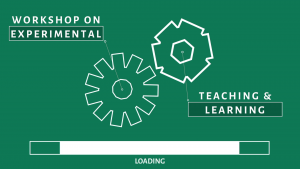 In the current pandemic, digital and blended learning has gained new momentum. This has boosted innovation and creativity among university educators and e-learning experts at the eight EPICUR partner universities. We believe that integrating these didactic and technological advances sustainably into the foundation of European Universities will transform the culture of teaching and learning beyond pandemic-driven needs: helping students not only to better achieve intended academic learning outcomes but, in particular, to develop future skills that are needed more urgently than anticipated in society and working life, among them classic skills such as creativity and problem-solving skills as well as basic digital skills such as digital interaction, collaboration and agile working. We also believe that dialog between our partners about the way each of them has maneuvered this swift move into the virtual teaching and learning space can be a source of personal and institutional growth, as each of our partners started from different levels and grades of digitalization. Understanding how each of our universities coped with the challenges of moving the physical classroom into a digital setting, will help us to develop programs and course formats that match the abilities and resources of the highly diverse student body of a European University spanning eight campuses, five countries, a multitude of languages and the learning cultures to match.
In the current pandemic, digital and blended learning has gained new momentum. This has boosted innovation and creativity among university educators and e-learning experts at the eight EPICUR partner universities. We believe that integrating these didactic and technological advances sustainably into the foundation of European Universities will transform the culture of teaching and learning beyond pandemic-driven needs: helping students not only to better achieve intended academic learning outcomes but, in particular, to develop future skills that are needed more urgently than anticipated in society and working life, among them classic skills such as creativity and problem-solving skills as well as basic digital skills such as digital interaction, collaboration and agile working. We also believe that dialog between our partners about the way each of them has maneuvered this swift move into the virtual teaching and learning space can be a source of personal and institutional growth, as each of our partners started from different levels and grades of digitalization. Understanding how each of our universities coped with the challenges of moving the physical classroom into a digital setting, will help us to develop programs and course formats that match the abilities and resources of the highly diverse student body of a European University spanning eight campuses, five countries, a multitude of languages and the learning cultures to match.
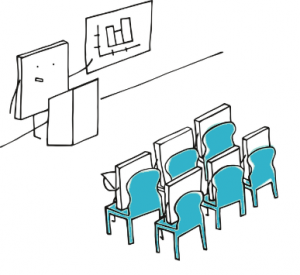 During the first annual EPICUR Forum, the ALU-Freiburg team, which is leading the work package on educational development, offered a whole day to explore these concepts and ideas. Educators and staff from all eight partner universities were invited to share their experiences from the past two semesters as well as their out-of-the-box ideas and projects for the future. The enthusiastic response to the open call for contributions showed that there is indeed a large interest and common eagerness to share and exchange practices and insights. Whether it is about coping with different time zones or slower internet connections, whether it is about creating seminars for freshers, building an inclusive intercultural community of learning, or using augmented and virtual reality to teach anything from archeology to engineering and cell biology – the alliance’s combined teaching force offers many inspiring ideas and solutions to challenges faced by all disciplines and study programs.
During the first annual EPICUR Forum, the ALU-Freiburg team, which is leading the work package on educational development, offered a whole day to explore these concepts and ideas. Educators and staff from all eight partner universities were invited to share their experiences from the past two semesters as well as their out-of-the-box ideas and projects for the future. The enthusiastic response to the open call for contributions showed that there is indeed a large interest and common eagerness to share and exchange practices and insights. Whether it is about coping with different time zones or slower internet connections, whether it is about creating seminars for freshers, building an inclusive intercultural community of learning, or using augmented and virtual reality to teach anything from archeology to engineering and cell biology – the alliance’s combined teaching force offers many inspiring ideas and solutions to challenges faced by all disciplines and study programs.
Dorthe Hutz and Eva Rüskamp who organized the event for the Freiburg Team answered some of our questions about the content and formats of the Workshops on Experiential Learning and the virtual fair on Experimental Teaching.
What made you choose a focus on experiential learning and what did you hope to accomplish by doing peer-to-peer workshops rather than just best-practices?
As an alliance, we focus on disseminating Liberal Arts & Science education, which is not very common in Europe yet, and on expanding traditional didactic formats to encompass the new reality of teaching and learning essentially taking place online. Beyond the idea of learning through experience or, more specifically, of learning through reflection on doing our understanding of experiential learning embraces all forms of learning that allow students to acquire knowledge and skills that link to real-world problems and real-life experiences. Formats and didactics that entail such aspects are often developed for face-to-face, in-person teaching and are often perceived as tough to translate into seemingly remote and distant, impersonal and passive digital settings. Especially having to do so rather overnight was very demanding for the teaching and coordinating staff of our partners.
With our workshop, we hoped to encourage educators not to abandon the idea of experience-based and interactive learning but to use the potential of digital settings to make it work. We are convinced that learning from fellow educators at peer-level rather than from “experts” makes teachers and their supporting staff feel more inclined to attempt this on their own and turn to their peers for help. And many fellow educators going through the same challenges shared their own learning journeys, not just their perfect products. They provided inspiration for organizing virtual meetings and encounters, i.e. experiential virtual spaces, in order to compensate for the lack of social encounter through physical mobility. We were excited to see the different digital environments our colleagues used to accomplish this goal, for example Areeka Hub presented by Andreas Zitek from the University for Natural Resources and Life Science in Vienna. Some of our colleagues, for example Nathalie Schwaiger, also from Vienna, even transferred entire summer schools into virtual space. In her presentation Ms. Schwaiger showed the thought process which led her to successfully combining different tools to reach the same didactic goals (collaborative work, establishing a community of learning, going on excursions to animal breeders) while facing the massive obstacle of having students join from 12 different time zones. Other workshops focused on why building intercultural sensitivity is as important in digital encounters as in face-to-face communication and how this can be trained in regular Zoom sessions, or how we can teach historical events and make them meaningful to diverse student groups.
In tackling experiential learning, one of the forms of teaching and learning most strongly associated with face-to-face communication, we showed that all kinds of teaching can work in digital settings and that there is a tool for almost any didactic goal. It might not be perfect (yet) but our colleagues showed that we could indeed provide a varied and engaging learning experience in digital settings.
In your second part you ran a ‘virtual fair’ on experimental teaching – how does that work and what did you learn?
The idea of the virtual fair was really a bit of a wild idea for us too. After we had put out an open call for contributions, looking for out-of-the-box-ideas and creative solutions to teaching in this brave new digital world, we received much more resonance than expected. There were so many great projects, some already running, some still in the developmental phase. So much like our peers, we were faced with the question of how to create a space that allows participants both to learn about new concepts and ideas, but also to discuss these, to exchange and explore ideas and new experiences. With the idea in mind of transforming an educational fair with information booths and a presentation stage into virtual space, we offered EPICUR Booths to projects for sharing and discussing materials from their projects and invited those who had just started developing ideas into actual teaching formats to give brief talks. These talks are now turning into the EPICURtalks series on Innovation in Teaching and Learning.
There were a couple of lessons learned – namely that the choice of a digital conference tool for such a fair is key. Our set-up was not as easy to navigate and, unfortunately, that was frustrating to some participants. If you have a bad map at a physical fair, you are likely to just make the best of it or wander around, hoping you eventually bump into the right booths. If you have a bad map at a virtual event, you are more likely to just give up and leave the meeting all together. Nevertheless, those who were not detained from the challenging navigation thoroughly enjoyed jumping in and out of the virtual booths, seeing the incredible range of creative solutions. Others stuck with the main stage, where they could simply follow the inspiring talks of their colleagues.
Which were some of the most surprising experiments in teaching presented?
That is tough; altogether, there were 19 different contributions, all of them unique and inspiring in their own way, particularly since they each addressed different disciplines and aspects of teaching in digital settings or with the aid of different tools. Virtual or augmented reality, for example, was applied in at least three contributions to very different ends. Our colleagues from Aristotle University in Thessaloniki use virtual reality to teach engineering, while the University of Freiburg’s Department of Archaeology employs augmented reality and google glasses to teach their students about ancient structures without having to visit or unearth them in some cases. And last but not least, the University of Natural Resources in Vienna offers its biology students – and anyone with a set of 3D-Glasses – a virtual journey through the Fungal Cell. Each of these approaches to teaching basic knowledge with modern tools is accompanied by didactic concepts, which are as much part of the experimental aspect as the tools themselves. Only with the right didactics to match, the technological innovation becomes a tool for effective digital teaching and with our segment on “experimental teaching” we wanted to highlight this double-fold process.
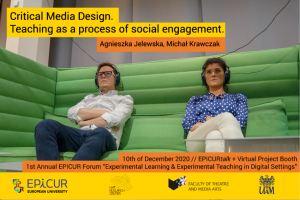 Two projects that received a lot of attention were the hybrid teaching theater by our partner, the University of Amsterdam [link to follow], which enhances the teaching and learning experience for students in a hybrid setting. This is one of the most challenging scenarios for educators and students to navigate but will likely soon become state of the art in many universities, whether they are part of a European University alliance or not. To see the attention that UvA has paid to making this space comfortable and purposeful at the same time, just showed what can be possible in the future.
Two projects that received a lot of attention were the hybrid teaching theater by our partner, the University of Amsterdam [link to follow], which enhances the teaching and learning experience for students in a hybrid setting. This is one of the most challenging scenarios for educators and students to navigate but will likely soon become state of the art in many universities, whether they are part of a European University alliance or not. To see the attention that UvA has paid to making this space comfortable and purposeful at the same time, just showed what can be possible in the future.
The other project on “Doing Field and Lab Work in Corona Times” just illustrated the ingenuity of students and teachers. Being on full lock-down, Eugenio Diaz-Pines of BOKU had to find ways to teach his students about soil analysis in their own homes. Simple enough, he figured and had his students sample the soil in the pots of their balcony and room plants, building their own laboratories at home and creating do it yourself videos of their experiments to show their own skills. This highly engaging format which he accompanied with a peer review, just shows that even with limited access to the physical world, you can learn about it.
Many more projects can be found here and the speakers remain open to questions and are happy to discuss their formats and ideas.
How will EPICUR continue the dialog about teaching and learning in the future and promote further innovation?
We hope to encourage educators across the alliance to try out new tools and formats while ensuring didactic quality and student success, which is why EPICUR offers the institutional framework to develop and test new formats. Innovation can happen in small steps, a single classroom with a single teacher can affect the way students move forward in their studies. EPICUR will create a Community of Practice for these educators, so that their ideas can grow and inspire others. We think that through such a community inventive teachers can become multipliers, which will set a new standard in higher education in all of Europe. For that reason, EPICUR has assembled well-experienced staff involved in teaching, e-learning, instructional design, teaching evaluation etc. who are there to support anyone interested in contributing to the growing EPICommunity of Practice [more information to follow soon].
Innovation also takes big leaps and EPICUR will experiment with radically new concepts such as gamification as spearheaded by Aristoteles University Thessaloniki. Gamification concepts draw on insights of video gaming to enhance user experience and learner’s journey. This means that in addition to improving traditional forms of assessment, EPICUR seeks to find new ways to boost student interests and abilities. Other ideas may include variations of traditional formats, be it to enhance access for students from different language backgrounds of special needs such as the lecture translator, or be it finding combinations of online and offline activities in the area of mobility and language acquisition such as e-Tandems.
Recordings of the EPICURtalks, a series on “Innovation in Teaching and Learning,” which we kicked off at the first annual EPICUR Forum, are available on our YouTube Channel and will be expanded monthly by recordings from our continued live talks from all partner institutions.
If you are interested to learn more about the EPICURtalks, reach out to k.kiefel@zv.uni-freiburg.de, if you are interested in e-Learning contact dorthe.hutz@rz.uni-freiburg.de and if you are interested in WP3’s work on LAS contact Steven.randall@ucf.uni-freiburg.de.
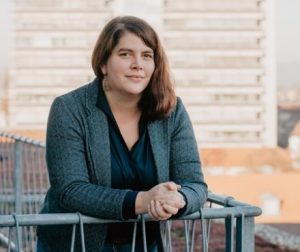
Eva Rüskamp
As an Associate Researcher at the English Department of the University of Freiburg, Eva Rüskamp pursues doctoral research on the culture and governance of rural transitions, while teaching Southern culture, politics, and women’s history in the US.
In 2020, she joined the EPICUR Team as its institutional mapping coordinator, a position she considers the human equivalent of a switchboard, connecting people, ideas, and partners from inside and outside the eight EPICUR universities.
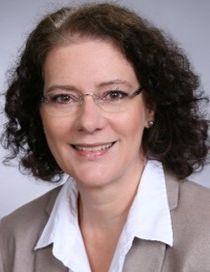
Dorthe Hutz
With a degree in Language and Cultural Studies and Business Administration (University of Giessen), Dorthe Hutz has specialized in digital learning technologies and design Expert for New Teaching Technologies (HFU Academy).
Since 2016, she has been a Research Associate for Media Didactics at the University of Freiburg. As a member of the E-Learning Department, coordinators and lecturers consult her on questions of digital teaching and learning in EPICUR.
